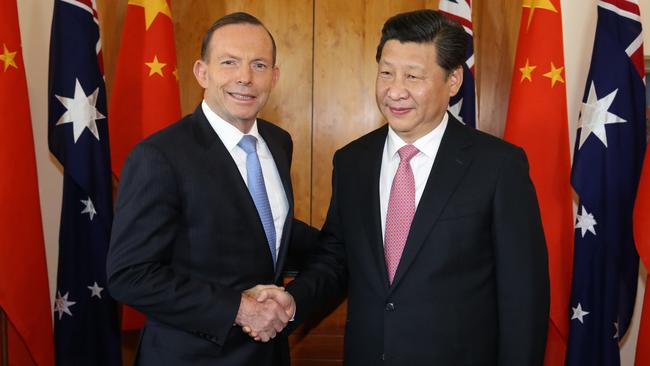Australians are wary of the US, but we increasingly fear China

In the aftermath of 9/11 and the invasion of Iraq, Australians were as worried by Islamist fundamentalism as they were by US foreign policies – a finding that attracted worldwide attention. They were divided about Australia’s military involvement in Iraq. They saw the spread of nuclear weapons and global warming as the foremost threats to the nation. Yet for all its problems, the rest of the world still seemed distant.
The overwhelming majority of Australians felt safe. They were upbeat about our economic future. There was a sense of optimism about China’s rise.
Two decades later, this year’s Lowy Institute Poll tells a different story.
Australia and China are once again on speaking terms after several difficult years. However, Australians’ trust in China has remained very low.
Six years ago, more than half of Australians (52 per cent) trusted China to act responsibly in the world. Today that number is 17 per cent. Seven in 10 Australians (71 per cent) consider it likely that China will pose a military threat to Australia in the future.
Australians are now roughly divided over the state of the relationship between Canberra and Beijing, with more seeing Australia-China relations as bad than good. Half the population say we should place more emphasis on deterring China’s use of military force, compared with 45 per cent who say we should prioritise a stable relationship.
Most Australians (83 per cent) see the US alliance as important to our security – one of the most consistent findings across the course of the poll’s history. About two-thirds of the population support the acquisition of nuclear-powered submarines under AUKUS, which is steady since its announcement three years ago.
The number of Australians who say they have confidence in US President Joe Biden has fallen to 46 per cent, 23 points below his first year in office. Despite this, two-thirds of Australians (68 per cent) would prefer to see Biden re-elected as president in November. Fewer than one in three (29 per cent) would prefer to see his opponent, Donald Trump, return to the White House.
For the third year in a row, Japan has topped the bill as “Australia’s best friend in Asia” from a list of six countries (a place China held as recently as 2016). Feelings towards Japan have remained warm across a range of metrics, reflecting shared values, interests and strategic outlook.
However, India and Indonesia, long recognised by policymakers as important emerging powers in our region, have consistently elicited mediocre levels of trust and warmth from Australians.
Australians feel less safe after the double blow of the Covid-19 pandemic and Russia’s invasion of Ukraine. Sixty-two per cent of Australians say they feel “safe” or “very safe” – a full 30 points below the high watermark of 2010.
Some threat perceptions have risen significantly. Cyber attacks from other countries, followed by the risk of war in our region – whether over Taiwan or in the South China Sea – are now seen as our top threats.
Australians feel less threatened by the wars in Ukraine and the Middle East. However, support for Australian government assistance to Ukraine remains high – and three-quarters of Australians are in favour of reopening Australia’s embassy in Kyiv.
Concerns about climate change have been evident in every edition of the Lowy Institute Poll. However, given cost-of-living pressures, more Australians now prioritise “reducing household energy bills” over “reducing emissions”.
This doesn’t mean Australians are unwilling to act. Support remains widespread for subsidising renewable technology (87 per cent), committing to a more ambitious national emissions reduction target (72 per cent), and hosting the annual UN climate summit in Australia (70 per cent).
Meanwhile, views on different energy sources have shifted considerably.
Six in 10 Australians (61 per cent) now say they support using nuclear power to generate electricity – a reversal of sentiment towards nuclear energy from more than a decade ago.
Support for renewable energy generation remains solid while attitudes towards coal have darkened considerably. Six in 10 now support reducing coal exports to other countries (60 per cent) and banning new coalmines (59 per cent).
Most Australians (58 per cent) remain optimistic about the country’s economic outlook. However, this represents the second lowest reading in the history of the poll, and economic optimism among younger age groups has declined markedly.
Nonetheless, positive views of free trade stand at an all-time high – a noteworthy result in the face of growing protectionist sentiment in the US and elsewhere.
On the other hand, a small majority of Australians (52 per cent) sees more risk than opportunity in the rapid proliferation of artificial intelligence.
Views on immigration continue to divide the public, with almost half of Australians saying our migrant intake is “too high” (48 per cent), and the other half saying it is “about right” (40 per cent) or “too low” (10 per cent).
Australians overwhelmingly agree (90 per cent), however, that cultural diversity – a product of many years of immigration – has been positive for Australia.
For two decades, the Lowy Institute Poll has reflected a rapidly changing world through Australian eyes. Today, that world no longer appears as distant. The line between international and domestic issues has further blurred.
The tyranny of distance has now been replaced by the predicament of proximity.
Michael Fullilove is the executive director of the Lowy Institute. Ryan Neelam is the author of the 2024 Lowy Institute Poll.



When the Lowy Institute conducted its first annual poll in 2005, Australians looked out to a very different world.